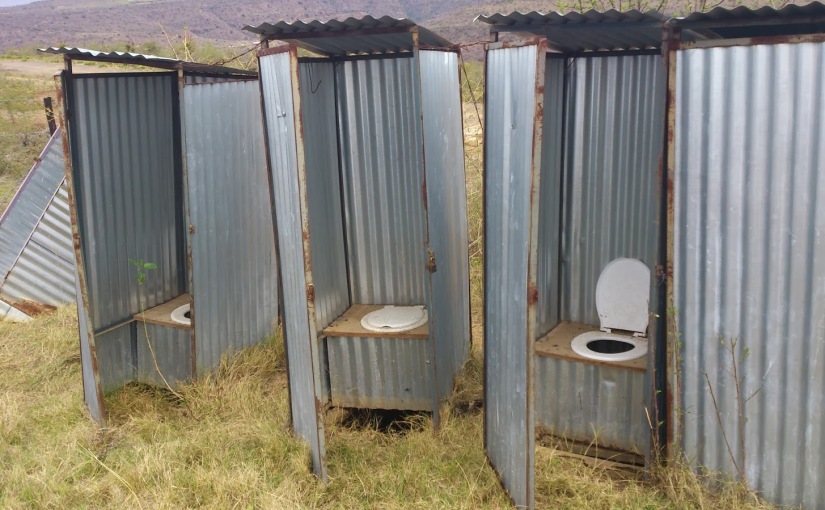In a previous entry, Talita Mshweshwe, shared the story of Siyabonga, who attends school in what is known as a “mud school”. There are approximately 300 mud schools in the Eastern Cape, although the Department of Basic Education (DBE) is not exactly sure how many there are. It is concerning that the DBE has still not given information as to when the schools will be built, which schools will be built or where Siyabonga’s school is on the list. Siyabonga reveals the extent of the problem in the mud school.
We do not have toilets
The school used to have toilets that were made out of iron. We can’t use the toilets because they are in such a bad state. The bad weather has damaged the toilets and it is really dangerous when the younger children use them. Out teachers told us not to use them any longer.

We have been using the veld that is far away from school. Because of the distance, we can’t go to the toilet during class time. Our teacher takes us to the veld during break. It is not safe for us to go to the veld alone. We really suffer because we can’t go to the toilet when we need to and the walk is so long. The girls have a really hard time when they are menstruating. We do not feel comfortable changing our sanitary pads in front of boys. Even when we go deeper into the veld, there are always herd boys who look at us while we are trying to change and we cannot avoid them. We would rather stay at home than embarrass ourselves. I feel really bad about missing school, but what else can I do?

We live in a nation where women and children are classified as a vulnerable group. Siyabonga is doubly vulnerable. It is concerning that the lack of school infrastructure impedes on her access to education, which affects great number of children in the province who face the same problems. Being stuck at home because they are menstruating is as if they are serving time for being women. The issue is, however, not confined to this school. In Melibuwa Senior Primary School the conditions are no better. When the school children need to relieve themselves, they also use open grassy areas where they are clearly visible.
Children cannot influence policy in a direct way. They are completely dependent upon the government and civil society to protect and to promote their rights. The parents of these rural areas try as far as possible to refurbish broken down schools. However, because they come from poverty stricken areas, they are not able to provide the necessary upgrades. The responsibility of advancing rights of human dignity and access to education rests with the government. A toilet should be seen as a basic part of the fabric of the building.
We have no electricity
Our classrooms are always dark. We have no electricity so we open the windows for the light to come in. In winter when it is very cloudy we can’t see the board, so sometimes we do not understand exactly what our teacher is saying. In summer we feel so hot because we do not have any fans. It is really difficult to pay attention to our teacher because we share a single desk between three girls.
We have no water
Our school gives us food because so many of us do not have enough food at home. Sometimes, when we want food, the teachers tell us that we will not be getting any because the water from the tanks has run out. Other times they tell us not to drink the tank water because it is being saved to prepare tomorrow’s meal. It is so hard on us in the summer because we get thirsty and the heat in the classroom is awful. Some children have nosebleeds because of the heat and they are sent home.

Water and electricity are basic amenities essential for survival. A school without water is potentially life threatening. Furthermore, the Constitution recognises these as rights. It is unimaginable what a summer’s day is like in this school. Such levels of discomfort should not be experienced by children.
The dust in the classroom makes me cough
My school is falling apart. The roof is caving in and the mud at the corners of the building is crumbling. The dust from the mud makes us cough so much and it gets into our eyes. The iron roof looks like it will fall in the windy weather. My books also get damaged when the roof leaks. Sometimes, I cannot concentrate because I am worried that the wind outside will blow my school roof away like what has happened at another school.
The conditions of the school illustrate the systematic failure of the DBE in achieving its goal of eradicating mud schools, as it promised to do by 2004. It is unacceptable that the DBE has not pushed for change when the funds have been made available through the ASIDI programme. Instead there has been serious under-spending of the funds and thus future project funding will be reduced. The ASIDI programme has been rolled out with serious delays. These delays will leave scores of children in the Eastern Cape in the same position as they have been for the past twelve years.
By: Talita Mshweshwe
Disclaimer: The opinions expressed by the Realising Rights bloggers and those providing comments are theirs alone, and do not reflect the opinions of the Legal Resources Centre. The Legal Resources Centre is not responsible for the accuracy of any of the information supplied by the bloggers.
